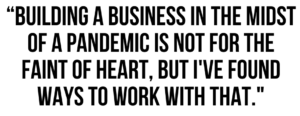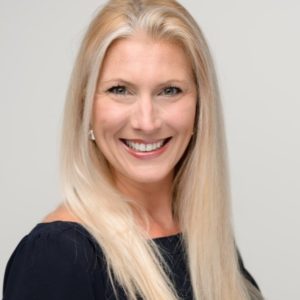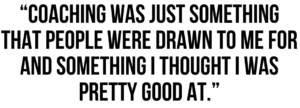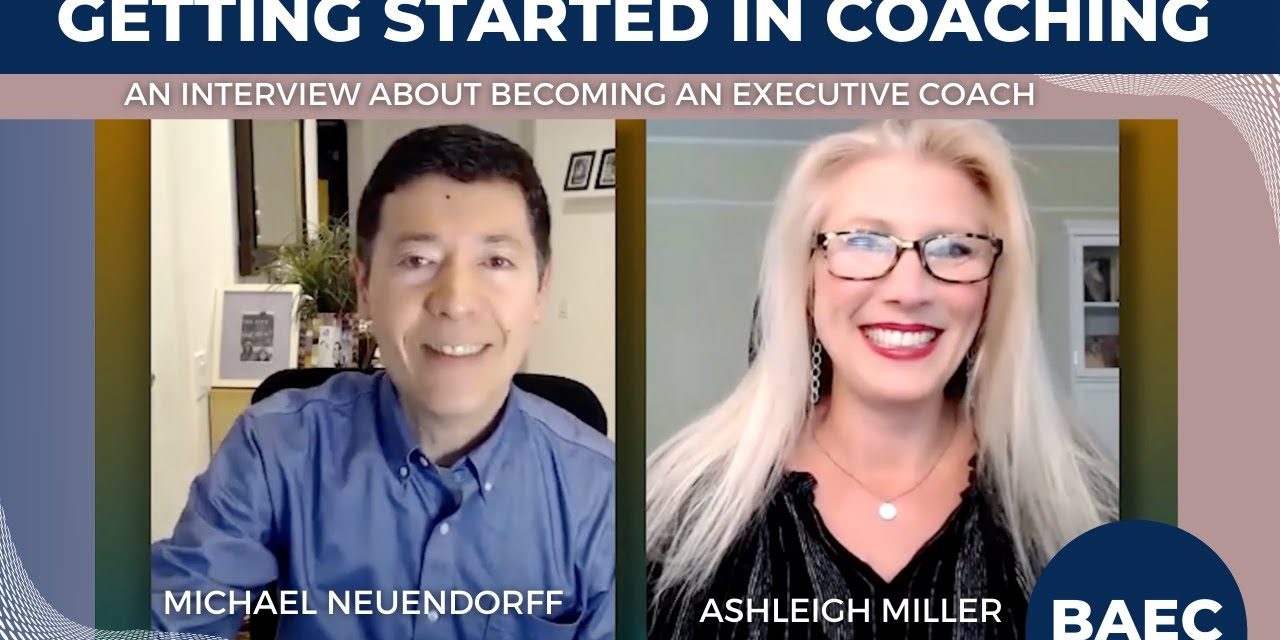Recently our own Michael Neuendorff interviewed Ashleigh to get her take on the role of business and leadership coaches in today’s ever-changing business environment.
Michael Neuendorff: I’m going to jump right in to learn more about you and your coaching business. What made you decide to move from professional services to executive coaching, since we know that professional services is where you spent the bulk of your career at that time?
Ashleigh Miller: I always had this sense that I wanted to go into business for myself, but, being in my 40s, the golden handcuffs of my job were getting pretty darn tight. However, the winds of change started to blow, and I finally saw the opportunity to leave my staff job and start a business of my own. Admittedly, it took me some time to figure out what I wanted to do in the second half of my career. I had to figure out what that looked like. So, I spent quite a bit of time reflecting, thinking, reading, taking freelance assessments, trying to figure out who I was and what I wanted to become, and who I wanted to serve. Then I realized that I’d actually been coaching people my whole life, whether it was friends or colleagues. Coaching was just something that people were drawn to me for and something I thought I was pretty good at. I was fortunate to find the perfect profession for me. 
Michael Neuendorff: I can relate to your answer. I certainly feel the same way about my search to land in this profession, too. I know you’ve now been in business for three years, but looking back, what was most difficult for you in making the transition from employee to business owner?
Ashleigh Miller: Lots of things, I sort of liken it to being launched into space and spinning around by yourself out there with no hope of getting back to Earth. That sense of leaving corporate America and going from 270,000 colleagues to just me. So that was challenging. The loss of identity and not even realizing that my identity was so closely tied to that organization. It became a “Who am I now?” moment. My challenge became reinventing myself.
I remember being on a pre-COVID networking ZOOM call. We went around the virtual room, with everybody introducing themselves. When it was my turn to introduce myself, I absolutely froze. I said: “I don’t know who I am. I don’t know how to introduce myself. I don’t know what I do.” And I left the meeting. Wow. That was a breakthrough moment for me because I realized: “OK, I have a lot more work to do.” So, there was a lot of self-development and self-reflection that I went through. It was challenging but good. And then, when I launched, the “imposter syndrome” of not feeling that I was genuinely qualified to do this started to sneak in a little bit. But I worked through that, and here I am today.
Michael Neuendorff: You’ve come so far from that time of being unfocused, and now you’re quite clear. What’s the mix of professional services that you’re currently offering?
Ashleigh Miller: I offer one-on-one executive coaching, which I love, and then I do team coaching. I do quite a few workshops and facilitation seminars around communication skills, leadership skills, business development, and teaming. That’s become my wheelhouse.
Michael Neuendorff: I know you’ve reached a certain level of success in your business, which is fantastic. I’d like to learn about what’s worked for you since launching your consultancy to create momentum and develop business. I know you’ve tried a lot of different things; you’ve been very creative, motivated, and active. What have you found that’s been most successful for you?
Ashleigh Miller: I think the biggest thing has been good old-fashioned networking and keeping up connections with people, staying on people’s radar, telling anyone who will listen what I’m doing with my life, going to breakfast and lunch meetings, and going to networking events, although those came to an abrupt halt with the pandemic. Also, saying “yes” to every introduction that anyone wants to offer to me has been fantastic. That includes groups of friends and family and not just my professional network. It’s been fun watching my network expand through new connections. So, at its most basic, it’s staying in front of people. I do this by consistently placing content on LinkedIn. Also, when I find something of interest, I make sure that I send that out in an email to everyone.
Building a business in the midst of a pandemic is not for the faint of heart, but I’ve found ways to work with that. For example, on networking Zoom calls, I take screenshots of everybody who’s participating and later I look them up on LinkedIn. I’ve made lots of connections that way.
Michael Neuendorff: Oh, I like that tip. One of the things I want to reiterate is that you took every chance to tell people what you’re doing. I think some coaches have pulled back from that, falling into the imposter syndrome trap you talked about earlier or getting all wrapped up in their identity search. I think they put off telling certain people

what they do because they’re not sure themselves yet. But I feel like you’ve pushed through that fear and put yourself out there.
Ashleigh Miller: Yes, but when I decided to start my own business, that wasn’t the case. I realized that I had to push myself to make it work. That determination helped me get through some of those very vulnerable moments when I was afraid to approach certain people because I worried about what they would think. But I found that, by and large, people want to help other people. I played a lot of mind tricks to get over fear and just push through, knowing that it’s the only way. No one is going to come knocking at my door. I got to put myself out there. I can’t just sit here on the couch and hope that somebody knocks on the door and says: “Hey, are you an executive coach?” I had to just put myself out there.
Michael Neuendorff: I felt the same way when I started my business in 2008. I started right at the beginning of the Great Recession. Those were tough times, and it forced me to dig deeper and really ponder the question: “Do I really want to do this because it’s going to be harder than I imagined?” And then I realized: “Yeah, I really want it.” I made a commitment to work harder and push harder and talk to 10 more people than I might have had the courage to do. As you noted, you just keep putting yourself out there.
Ashleigh Miller: That’s 100 percent it. You know, I personally froze when the pandemic hit. I thought: “What in the world does this mean?” I tried to stay productive, but I couldn’t mentally. I just couldn’t do it. So, I decided to paint all of the baseboards and trim in my house because I just wanted to do something productive while I was in this sort of mentally stunted state. And during that process, I thought: “You know what? I need to double down at a time like this to make my business work. I won’t let this get to me.”
Michael Neuendorff: I want to take you back again to the beginning of your business. If you could go back to the time you started this new career, would you do anything differently?
Ashleigh Miller: I think maybe attend even more networking events and dig deeper under every rock to find more opportunities to get myself in front of people. I’d spend more time listening to successful people, trying to learn what was their formula for success. I’d search out mentors and other coaches to talk to. I’m so lucky to have several different cohorts of coaches that I stay connected with now who are like family to me. They’ve become my cheerleaders, and I just find it so inspirational to be connected with them.
Michael Neuendorff: I understand that you also like to do team coaching. There are many coaches interested in working with teams, but it’s not exactly the same as one-on-one coaching. What advice do you have for newer coaches to prepare to coach teams?
Ashleigh Miller: Find a network of coaches to bounce ideas off and get support from. I think that’s really, really important. Probably the biggest thing is, and it’s important in one-on-one executive coaching as well, to establish trust and rapport as quickly as possible because you’re essentially a stranger coming into their organization, into their team, and you’re only going to be as effective as their ability to be vulnerable and trust you. It’s vital to figure out a way to build that trust upfront, or else they will not share with you. They’re going to be skeptical, and you’re not going to be productive. With my clients, I tell them that confidentiality is of utmost importance to me, and anything that I do or share with the team is in an effort to help. I will never communicate anything that I think in any way would hinder the team’s progress. It’s important to really drive that point home at the start. 
Michael Neuendorff : And that seems to help the team become more vulnerable and open in these conversations.
Ashleigh Miller I’ve found that to be true, although it’s not 100 percent foolproof.
Michael Neuendorff: Do you generally mix team coaching with one-on-one coaching?
Ashleigh Miller: I tend to evaluate the team to understand what the team’s issues are. Kind of feel out what’s happening, and then decide where they might need a group teach or individualized work. I ask: “What’s a new concept that would help this team as a whole?” I’ll work with the entire team, and then I’ll meet with members individually after that. We then come back together as a team, work through some things, and it really depends on what the issues are. I try to be flexible and bring in whatever is needed for each unique situation.
Michael Neuendorff: Great. Well, Ashleigh, we’ve had a really good conversation, and I’ve learned a lot about your business and what you’ve done. I’m so happy to know you and to be able to wish you a happy third anniversary for your business and congratulate you on all the success you’ve achieved so far. Thank you so much for being with us today and sharing some great information with fellow coaches.
Ashleigh Miller: Thanks for having me. So good to see you again. I could not have gotten to this point without the CEC and all of your help and guidance and mentoring. So, thank you.
You can view the video version of this interview here.
Take a look at our other Conversations with Coaches here.







